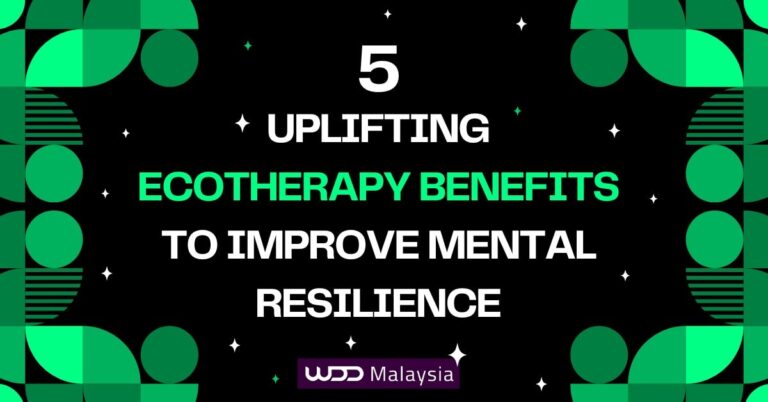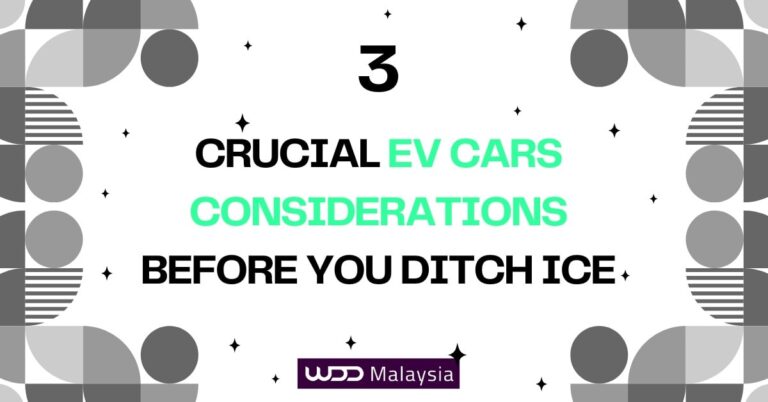
Introduction to Personalization Web Design
In the current digital context, web design has evolved from static pages to dynamic, interactive platforms that cater to the diverse needs of a global audience. One of the most influential strategies in modern web design is personalization, which has transformed the way businesses engage with their customers.
Defining Personalization in the Context of Web Design
Personalization in web design refers to the practice of creating tailored online experiences for users based on their preferences, behaviour, and demographics. It involves customising website content, layout, and functionality to resonate with individual visitors, often through AI-generated solutions.
By leveraging data-driven insights, businesses can deliver personalized recommendations, product suggestions, and targeted promotions that align with each user’s interests and needs.
The Significance of Personalization for Businesses
The significance of personalization for businesses cannot be overstated. In today’s competitive digital landscape, providing a unique and tailored experience on a business site is crucial for capturing and retaining audience attention. Research shows that personalized websites yield higher engagement rates, increased conversions, and improved customer satisfaction. Moreover, by delivering relevant content and intuitive navigation, businesses can foster long-term relationships with their customers.
What is AI Website Builder?

Definition and Explanation of AI Website Builder
An AI website builder is a revolutionary tool that leverages artificial intelligence to streamline the website creation process. Unlike traditional methods that require extensive coding knowledge and design skills, an AI website builder simplifies the entire process, making it accessible to everyone.
These platforms use advanced machine learning algorithms to analyze user input and preferences, generating a customized website in just a few minutes. Whether you’re a small business owner, a freelancer, or someone looking to create and publish a personal blog, an AI website builder can help you create a professional website with minimal effort.
Benefits of Using a Free AI Website Builder
Using an AI website builder offers numerous advantages that can significantly enhance your website creation experience:
Time-efficiency: One of the most compelling benefits is the speed at which you can create a website. With an AI website builder, you can have a fully functional site up and running in just a few minutes, saving you valuable time.
Cost-effectiveness: Many AI website builders are available for free or at a low cost, eliminating the need for expensive web design services. This makes it an ideal solution for startups and small businesses with limited budgets.
Ease of use: Designed with user-friendliness in mind, AI website builders require no prior technical knowledge. The intuitive interfaces guide you through the process, allowing you to create a professional-looking website effortlessly.
Customization: Despite their simplicity, AI website builders offer a range of customization options. You can tailor your site to match your brand’s identity, ensuring it stands out and meets your specific needs.
Scalability: AI website builders are built to handle large volumes of traffic and data, making them suitable for growing businesses. As your site attracts more visitors, the platform can scale to accommodate increased demand without compromising performance.
By leveraging an AI website builder, you can create a dynamic and engaging online presence that meets your goals and objectives with ease.
The Power of Personalization of Content

In the realm of web design, the Power of Personalization is a transformative force that reshapes the digital landscape. By enhancing User Experience through tailored experiences, businesses can forge deeper connections with their audience, leading to remarkable success stories and amplified engagement and conversion rates.
Enhancing User Experience through Personalization
The implementation of website personalization has led to remarkable enhancements in User Experience. Tailoring content and features to align with individual preferences creates a sense of exclusivity for visitors. For instance, a leading e-commerce platform utilised AI-driven user experience personalization to curate product recommendations based on browsing history and purchase behaviour.
This resulted in a 30% increase in average order value and a 25% surge in customer retention, showcasing the profound impact of personalized web design on user satisfaction and loyalty.
Case Studies: Success Stories of Personalized Web Design
A renowned travel website harnessed the power of personalization by customising destination recommendations based on users’ previous searches and interests. This led to a 40% rise in click-through rates and a substantial increase in bookings, underscoring the effectiveness of personalized content in driving user engagement and conversion.
An online fashion retailer leveraged website personalization to deliver tailored product suggestions, resulting in a 20% uplift in conversion rates and an impressive reduction in bounce rates. These success stories exemplify how personalized web design can elevate the overall user experience while delivering tangible business outcomes.
The Impact of Personalization on Engagement and Conversion Rates
The impact of personalization on engagement and conversion rates cannot be overstated. Businesses that prioritise website personalization witness heightened levels of user interaction, prolonged session durations, and increased conversion rates.
By tailoring content to match individual preferences, businesses can effectively guide visitors through personalized sales funnels, resulting in higher conversion rates and amplified revenue streams.
In essence, the strategic integration of personalized content within web design not only enriches user experience but also serves as a catalyst for bolstering engagement metrics and driving conversions.
AI-powered Website Creation Platforms: AI Website Builder
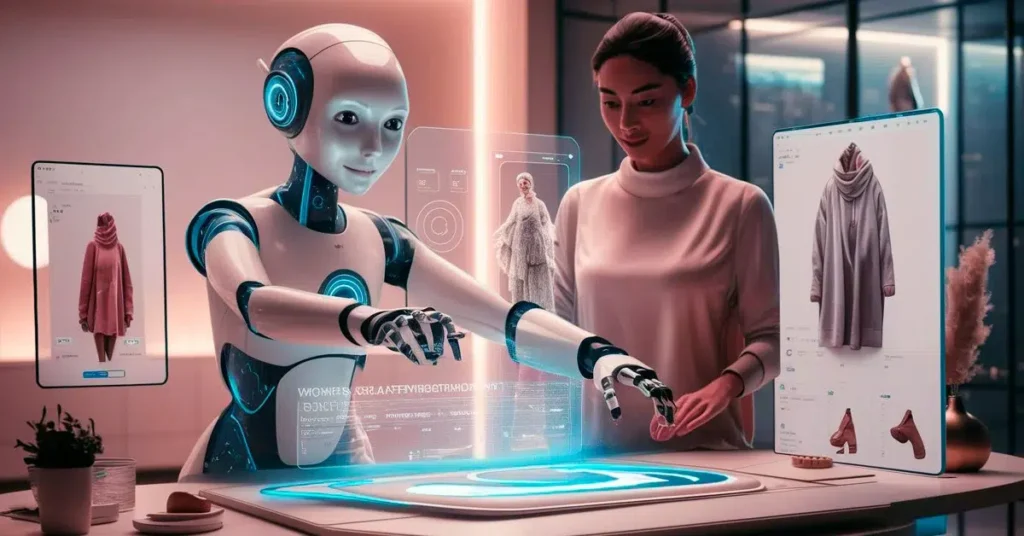
In the ever-evolving landscape of web design, AI-powered website creation platforms have emerged as a revolutionary force, reshaping the digital sphere and redefining the way websites are developed and optimised.
Revolutionising Design with AI
The integration of Artificial Intelligence in web design is revolutionising the process of creating websites through the use of modern tools like the AI site builder. These AI-powered platforms leverage advanced algorithms to analyse user behaviour, preferences, and interactions, enabling businesses to craft personalized and intuitive online experiences.
By harnessing the power of AI, website designers can automate the generation of tailored content, optimise user interfaces, and streamline the development process of new website. This transformative approach not only expedites website creation but also ensures that each site is uniquely tailored to meet the needs of its target audience.
Examples of AI in Action: AI Generated Websites
Leading companies across various industries are embracing AI-powered website creation platforms to elevate their online presence. Many of these platforms utilize advanced AI tools to customize and generate content efficiently, ensuring a robust website creation experience. For instance, a prominent e-commerce enterprise utilised an AI-driven platform to dynamically adjust website layouts based on individual user preferences, resulting in a 25% increase in user engagement and a 30% surge in conversion rates.
Similarly, a renowned news publication leveraged AI-powered content generation tools to deliver personalized news feeds to its readers, leading to a substantial rise in user retention and ad revenue. These examples underscore how AI is transforming website personalization by empowering businesses to create dynamic and adaptive online environments.
The Role of Machine Learning in Personalization
Machine learning plays a pivotal role in driving personalization within web design, often through the use of an AI tool. Through sophisticated algorithms and data analysis, machine learning enables websites to adapt their content and functionality based on user interactions.
By continuously learning from user behaviour patterns, machine learning algorithms facilitate the delivery of highly personalized experiences that cater to individual preferences. This dynamic approach not only enhances user satisfaction but also empowers businesses to optimise their online presence for maximum impact.
In essence, AI-powered website creation platforms are at the forefront of revolutionising website personalization through advanced technologies such as machine learning. By leveraging these innovative tools, businesses can create websites that dynamically respond to user needs and preferences while delivering unparalleled User Experience.
Choosing the Right AI Website Builder

Key Features to Consider
Selecting the right website builder is crucial for creating a site that meets your needs and exceeds your expectations. Here are some key features to consider:
Ease of use: Opt for a website builder that is intuitive and easy to navigate. A user-friendly platform will save you time and reduce the learning curve, allowing you to focus on creating content and engaging with your audience.
Customization options: Look for a website builder that offers a variety of templates and design options. The ability to customize your site ensures it reflects your brand’s unique identity and caters to your specific requirements.
Scalability: Choose a website builder that can grow with your business. Ensure the platform can handle increased traffic and data as your site expands, providing a seamless experience for your visitors.
Integration: Consider a website builder that integrates with other tools and platforms you use, such as social media, e-commerce solutions, and marketing automation tools. This will streamline your workflow and enhance your site’s functionality.
Support: Reliable customer support is essential. Look for a website builder that offers comprehensive support resources, including tutorials, FAQs, and live assistance, to help you resolve any issues quickly.
Cost: Evaluate the cost of the website builder and ensure it fits within your budget. Many platforms offer free plans or affordable pricing tiers, making it easier to find a solution that meets your financial constraints.
Security: Robust security features are vital for protecting your website and user data. Choose a website builder that offers SSL certificates, regular updates, and other security measures to safeguard your site.
Mobile responsiveness: Ensure the website builder creates mobile-responsive sites that adapt to different screen sizes and devices. With the increasing use of mobile devices, a responsive design is crucial for providing a positive user experience.
By considering these key features, you can select the right website builder that aligns with your business type and needs and helps you create a professional, engaging, and secure online presence.
Content Writers and SEO Efficiency

In the realm of digital marketing, content writers play a pivotal role in crafting personalized content that resonates with target audiences while optimising it for SEO success. The fusion of compelling storytelling and strategic optimization techniques is instrumental in driving organic traffic and enhancing online visibility.
Additionally, many web hosting packages offer a free domain when users subscribe to their services, providing a valuable incentive for potential customers creating their websites.
Crafting Personalized Content for Target Audiences
The art of crafting personalized content requires a deep understanding of the target audience’s preferences, pain points, and aspirations. Content writers must conduct thorough research to gain insights into the demographic profiles, behaviour patterns, and search intent of their audience. By leveraging this knowledge, they can tailor their content to address specific needs and deliver value-driven narratives that establish meaningful connections with readers.
Moreover, the creation of plagiarism-free content is paramount in maintaining authenticity and credibility. By generating original and insightful material, content writers can position brands as authoritative voices within their respective industries, thereby fostering trust and loyalty among their audience.
To achieve SEO efficiency, content writers should seamlessly integrate relevant keywords into their content while ensuring natural language flow. Strategic placement of targeted keywords within titles, headings, meta descriptions, and body text enhances search engine visibility while catering to user search queries. Additionally, incorporating semantic variations and long-tail keywords enriches the depth and contextuality of the content, further optimising it for search engine algorithms.
SEO Strategies for Personalized Content
Incorporating diverse multimedia elements such as images, videos, infographics, and interactive features enriches the overall user experience while bolstering SEO performance. Engaging visual assets not only captivate audiences but also contribute to lower bounce rates and extended dwell times on web pages. Furthermore, optimising multimedia components with descriptive filenames, alt tags, and captions enhances accessibility for both users and search engines.
Another essential aspect of SEO-optimised content is the seamless integration of internal and external links. By strategically interlinking relevant pages within a website’s architecture and citing authoritative external sources, content writers can enhance content credibility while improving site navigation and user engagement metrics.
Furthermore, leveraging social media platforms as distribution channels for personalized content amplifies its reach while stimulating user interactions. Sharing valuable insights across social networks encourages audience engagement through likes, shares, comments, and direct referrals to the on site live website—contributing to enhanced brand visibility and referral traffic.
In essence,content writers, armed with a profound understanding of their audience’s preferences coupled with strategic optimization techniques are instrumental in creating personalized narratives that resonate with readers while elevating organic discoverability through effective SEO strategies.
Tools That Enhance Personalization for Business
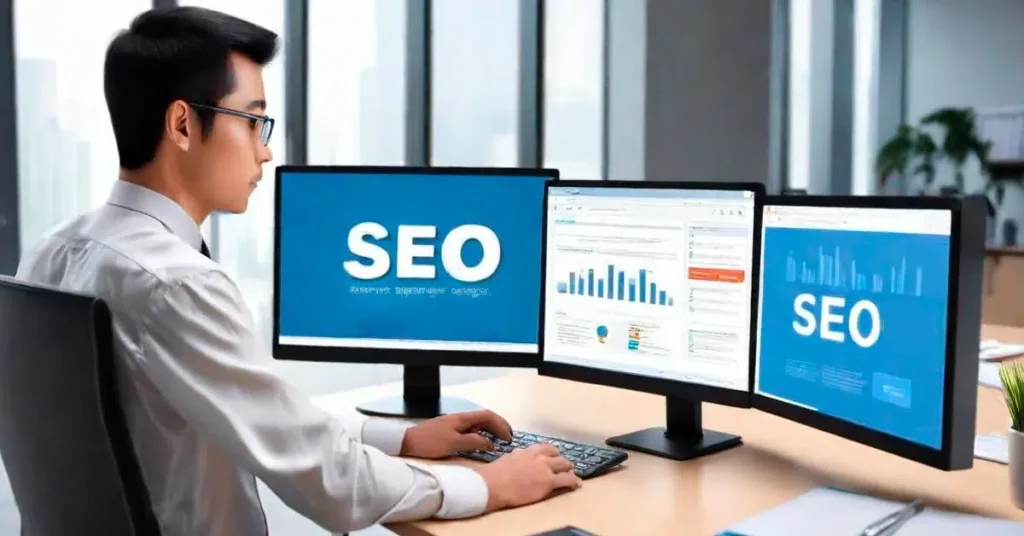
In the realm of digital marketing, businesses rely on the power of ai myriad of tools to enhance personalization and optimise their online presence. From streamlining SEO processes to generating compelling web content, these tools play a pivotal role in delivering tailored experiences to users.
SEO Automation Tools
The advent of SEO automation tools has revolutionised the way businesses manage and optimise their online visibility. An AI site generator can create mobile-friendly websites that automatically adjust to different devices, enhancing user experience and accessibility.
These sophisticated platforms empower marketers to automate various aspects of search engine optimization, ranging from keyword research and analysis to performance tracking google analytics, and reporting. By leveraging AI-driven algorithms, businesses can streamline their SEO strategies, identify organic search opportunities, and monitor website rankings with precision.
Moreover, SEO automation tools enable seamless integration with popular website hosting platforms, facilitating efficient content management and optimization. Marketers can effortlessly schedule content updates, implement meta tag optimizations, generate leads, and monitor site speed and performance—all essential elements for enhancing SEO efficiency.
Furthermore, these tools offer advanced image optimization features that ensure visually appealing web content while adhering to best practices for search engine discoverability. By automatically compressing and labelling images with descriptive filenames and alt tags, businesses can elevate their website’s visual appeal while boosting its ranking potential on search engine results pages.
In essence, the integration of ai technology of SEO automation tools empowers businesses to orchestrate comprehensive SEO strategies while ensuring that their web content is optimised for maximum visibility and user engagement.
Free AI Website Generator Tools
Content generation is a cornerstone of personalized web design, and the emergence of advanced content generator tools has redefined the landscape of digital storytelling. A free AI website builder offers accessible and user-friendly tools for individuals and small businesses looking to create websites easily and affordably. These innovative platforms leverage AI-powered algorithms to craft compelling narratives, produce engaging visuals, and curate interactive elements, building websites that resonate with diverse audiences.
By harnessing the capabilities of content generator tools, businesses can expedite the creation of diverse multimedia assets such as articles, blog posts, infographics, videos, and more—enriching their web content with immersive storytelling elements. This not only fosters deeper connections with users but also amplifies the overall user experience by delivering dynamic and engaging narratives.
Moreover, content generator tools facilitate a seamless process of integration with social media platforms—enabling businesses to effortlessly distribute personalized content across various channels. By automating the scheduling and sharing of captivating stories across social networks, marketers can expand their brand’s reach while stimulating user interactions—a pivotal element in fostering community engagement.
Additionally, image generator functionalities within these platforms empower businesses to create visually stunning graphics that complement their web content. From dynamic infographics to captivating illustrations, image generator tools enable marketers to enrich their storytelling efforts while enhancing visual appeal—a critical component in capturing user attention amidst a sea of digital content.
Empowering Search Performance through Personalization

In the realm of web design, the empowerment of search performance through personalization is a pivotal strategy that reshapes the digital landscape. By aligning content with user intent and optimising it for enhanced search visibility, businesses can leverage personalized approaches to elevate their online presence and engage with their target audiences effectively.
Personalization and Its Effect on Search Engine Rankings
The integration of personalization in web design has a profound effect on search engine rankings. Utilizing a free AI website can provide cost-effective solutions for startups and small businesses looking to create intuitive and personalized web designs. When web content is tailored to resonate with individual user preferences and behaviours, it creates a harmonious synergy between user intent and the information provided.
This alignment fosters a more engaging user experience, leading to prolonged session durations and lower bounce rates—factors that are highly regarded by search engine algorithms. As a result, personalized web experiences often receive higher visibility and ranking prominence on search engine results pages, driving organic traffic and enhancing online discoverability for businesses.
SEO Harmony: Aligning Content with User Intent
Achieving SEO harmony through the alignment of content with user intent is instrumental in driving organic search performance. By understanding the specific needs, queries, and interests of their target audiences, businesses can craft optimised content that directly addresses user intent.
This approach involves leveraging keyword analytics to identify relevant search queries and integrating them seamlessly into the content while maintaining natural language flow. Furthermore, by incorporating semantic variations and long-tail keywords, businesses can enrich the depth and contextuality of their content—enhancing its relevance to diverse user queries.
Moreover, Malaysian businesses can leverage localised SEO keywords to cater to the unique search behaviours of Malaysian local users. By integrating region-specific terms and phrases into their content, businesses can enhance their visibility within local search results—capturing the attention of geographically targeted audiences while fostering community engagement.
Optimising Content for Enhanced Search Visibility
Optimising content for enhanced search visibility entails a multifaceted approach that encompasses various elements such as keyword optimization, multimedia enrichment, link building strategies, and social media amplification. Introducing builder free options can significantly enhance accessibility, allowing users to create websites with ease and advanced features through freemium models.
Leveraging advanced analytics tools enables businesses to gain valuable insights into trending topics, popular search queries, and emerging keywords—empowering them to create web content that resonates with current user interests while anticipating future trends.
Furthermore, content optimization extends beyond textual elements to encompass multimedia assets such as images, videos, infographics, and interactive features. By optimising these visual components with descriptive filenames, alt tags, captions, and metadata, businesses can enhance both visual appeal and discoverability—enriching the overall user experience while bolstering search engine rankings.
In essence, empowering search performance through personalization requires a strategic fusion of personalized content creation techniques, localised keyword integration, and comprehensive optimization strategies—all aimed at delivering valuable insights while elevating online visibility for Malaysian businesses.
The Future of Web Design and Technology

As the digital landscape continues to evolve, the future of web design is poised to undergo significant transformations, driven by advancements in technology and shifting consumer behaviours. Anticipating these changes is crucial for businesses seeking to stay ahead of the curve and deliver cutting-edge online experiences that resonate with their audiences.
Predictions on the Evolution of Personalization
In the coming years, the evolution of personalization in web design is expected to reach new heights, propelled by innovative technologies and changing user expectations. One key prediction revolves around the integration of advanced AI algorithms to further refine user-specific recommendations and tailor online experiences with unprecedented precision. This will enable businesses to create highly personalized interfaces that cater to individual preferences, leading to enhanced engagement and conversion rates.
Moreover, December industry experts forecast a surge in the adoption of immersive technologies such as augmented reality (AR) and virtual reality (VR) within web design. These immersive experiences will enable businesses to offer interactive and personalized content that captivates users, fostering deeper connections and prolonged user engagement. By leveraging AR and VR technologies, businesses can create dynamic and visually compelling web environments that elevate the overall user experience while delivering unparalleled value to their audiences.
Furthermore, as technology continues to advance, there will be a heightened emphasis on data privacy and ethical personalization practices. Businesses will need to navigate the delicate balance between leveraging user data for personalization while respecting privacy regulations and earning consumer trust. This shift towards transparent and ethical personalization strategies will shape the future of web design, emphasising the importance of building meaningful connections with users based on mutual respect and trust.
Additionally, read industry experts anticipate a paradigm shift towards voice-enabled interfaces within web design. With the increasing prevalence of voice-activated devices and virtual assistants, businesses are expected to integrate voice-based interactions into their websites—enabling users to navigate personalized content through natural language commands.
This trend aligns with the growing preference for seamless and intuitive user experiences, positioning voice-enabled interfaces as a pivotal element in driving future web design innovations.
In essence, the future of web design holds immense potential for groundbreaking advancements in personalization driven by technological innovation. By embracing these predictions and staying abreast of emerging trends, businesses can position themselves at the forefront of digital transformation while delivering unparalleled online experiences that captivate their audiences.
Conclusion: How it Will Transforms Web Development Process
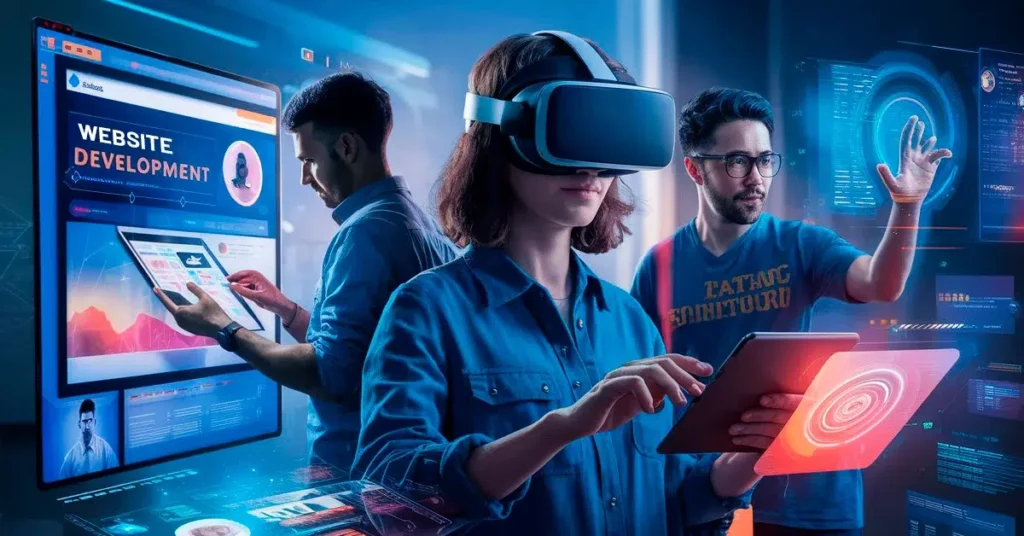
As the digital landscape continues to evolve, the integration of personalization within web design is poised to revolutionise the web development process. By tailoring online experiences to align with individual preferences and behaviours, businesses can transform their approach to creating dynamic and interactive web pages, fostering deeper connections with their audiences while driving tangible outcomes.
Recapitulating the Importance of Personalization
The importance of personalization in web design cannot be overstated. It serves as a cornerstone for businesses seeking to deliver tailored experiences that resonate with their target audiences. Through personalized content, intuitive navigation, and dynamic interfaces, businesses can capture and retain user attention—forging lasting relationships built on relevance and value.
Moreover, by leveraging data-driven insights and advanced technologies, businesses can elevate engagement metrics, drive conversions, and foster brand loyalty—a testament to the profound impact of personalization on the web development landscape.
Embracing personalization within web design empowers businesses to create immersive online environments that cater to diverse user needs while positioning them at the forefront of digital innovation.
The Continuous Journey of Innovation in Web Design
The continuous journey of innovation in web design is intrinsically linked to the evolution of personalization. As technology advances and consumer behaviors shift, businesses are presented with unprecedented opportunities to redefine their online presence through personalized experiences.
This ongoing pursuit of innovation encompasses advancements in AI-powered website creation platforms, sophisticated content generation tools, and comprehensive SEO automation solutions—all aimed at enhancing personalization capabilities within custom domain and web development.
Moreover, the future holds immense potential for groundbreaking advancements driven by technological innovation. By embracing these predictions and staying abreast of emerging trends, businesses can position themselves at the forefront of digital transformation while delivering unparalleled online experiences that captivate their audiences.
In essence, the integration of personalization within web design marks a transformative shift in how websites are developed and optimised—a shift that propels businesses towards a future where every interaction is tailored to meet individual needs and preferences.


